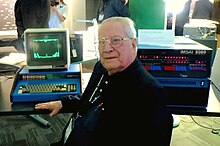
The Apple Computer 1, originally released as the Apple Computer and known later as the Apple I or Apple-1, is an 8-bit desktop computer released by the Apple Computer Company in 1976. It was designed by Steve Wozniak. The idea of selling the computer came from Wozniak's friend and Apple co-founder Steve Jobs. The Apple I was Apple's first product, and to finance its creation, Wozniak sold his HP-65 calculator for $500 and Jobs sold a second hand VW Microbus, for a few hundred dollars. Wozniak demonstrated the first prototype in July 1976 at the Homebrew Computer Club in Palo Alto, California.

Silicon Valley is a region in Northern California that serves as a global center for high technology and innovation. Located in the southern part of the San Francisco Bay Area, it corresponds roughly to the geographical area of Santa Clara Valley. San Jose is Silicon Valley's largest city, the third-largest in California, and the tenth-largest in the United States; other major Silicon Valley cities include Sunnyvale, Santa Clara, Redwood City, Mountain View, Palo Alto, Menlo Park, and Cupertino. The San Jose Metropolitan Area has the third-highest GDP per capita in the world, according to the Brookings Institution, and, as of June 2021, has the highest percentage of homes valued at $1 million or more in the United States.

Stephen Gary Wozniak, also known by his nickname "Woz", is an American electronics engineer, computer programmer, philanthropist, inventor, and technology entrepreneur. In 1976, with business partner Steve Jobs, he co-founded Apple Computer, which later became the world's largest technology company by revenue and the largest company in the world by market capitalization. Through his work at Apple in the 1970s and 1980s, he is widely recognized as one of the most prominent pioneers of the personal computer revolution.
Tiny BASIC is a family of dialects of the BASIC programming language that can fit into 4 or fewer KBs of memory. Tiny BASIC was designed in response to the open letter published by Bill Gates complaining about users pirating Altair BASIC, which sold for $150. Tiny BASIC was intended to be a completely free version of BASIC that would run on the same early microcomputers.

Li-Chen Wang is an American computer engineer, best known for his Palo Alto Tiny BASIC for Intel 8080-based microcomputers. He was a member of the Homebrew Computer Club and made significant contributions to the software for early microcomputer systems from Tandy Corporation and Cromemco. He made early use of the word copyleft, in Palo Alto Tiny BASIC's distribution notice "@COPYLEFT ALL WRONGS RESERVED" in June 1976.

The Homebrew Computer Club was an early computer hobbyist group in Menlo Park, California, which met from March 1975 to December 1986. The club had an influential role in the development of the microcomputer revolution and the rise of that aspect of the Silicon Valley information technology industrial complex.

Adam Osborne was a Thai author, software publisher, and computer designer who founded several companies in the United States and elsewhere. He introduced the Osborne 1, the first commercially successful portable computer.
"An Open Letter to Hobbyists" is a 1976 open letter written by Bill Gates, the co-founder of Microsoft, to early personal computer hobbyists, in which Gates expresses dismay at the rampant software piracy taking place in the hobbyist community, particularly with regard to his company's software.

Hackers: Heroes of the Computer Revolution (ISBN 0-385-19195-2) is a book by Steven Levy about hacker culture. It was published in 1984 in Garden City, New York by Doubleday. Levy describes the people, the machines, and the events that defined the Hacker Culture and the Hacker Ethic, from the early mainframe hackers at MIT, to the self-made hardware hackers and game hackers.

Gordon James Ramsay is a British chef, restaurateur, television personality and writer. His restaurant group, Gordon Ramsay Restaurants, was founded in 1997 and has been awarded 17 Michelin stars overall; it currently holds a total of seven. His signature restaurant, Restaurant Gordon Ramsay in Chelsea, London, has held three Michelin stars since 2001. After rising to fame on the British television miniseries Boiling Point in 1999, Ramsay became one of the best-known and most influential chefs in the world.
Homebrew, when applied to video games, refers to games produced by hobbyists for proprietary video game consoles which are not intended to be user-programmable. The official documentation is often only available to licensed developers, and these systems may use storage formats that make distribution difficult, such as ROM cartridges or encrypted CD-ROMs. Many consoles have hardware restrictions to prevent unauthorized development. A non-professional developer for a system intended to be user-programmable, like the Commodore 64, is simply called a hobbyist.

Craig Sinclair Gordon is a Scottish professional footballer who plays as a goalkeeper for Scottish Premiership club Heart of Midlothian, where he is club captain, and the Scottish national team.

PlayStation Portable homebrew refers to the process of using exploits and hacks to execute unsigned code on the PlayStation Portable (PSP).
Fred Moore (1941–1997) was an American political activist who was central to the early history of the personal computer. Moore was an active member of the People's Computer Company and one of the founders of the Homebrew Computer Club, urging its members to "bring back more than you take."

The Brewers Association (BA) is an American trade group of over 5,400 brewers, breweries in planning, suppliers, distributors, craft beer retailers, and individuals particularly concerned with the promotion of craft beer and homebrewing.

webOS, also known as LG webOS and previously known as Open webOS,HP webOS and Palm webOS, is a Linux kernel-based multitasking operating system for smart devices such as smart TVs that has also been used as a mobile operating system. Initially developed by Palm, Inc., HP made the platform open source, at which point it became Open webOS.

Altair BASIC is a discontinued interpreter for the BASIC programming language that ran on the MITS Altair 8800 and subsequent S-100 bus computers. It was Microsoft's first product, distributed by MITS under a contract. Altair BASIC was the start of the Microsoft BASIC product range.

Atari 2600 homebrew is a term describing hobbyist-developed games for the Atari 2600 video game console. The first such game was written in 1995, and more than 100 have been released since then. The majority of games are unlicensed clones of games for other platforms, and many were written for the technical challenge. There are also ROM hacks and some original games. Several games have received attention outside the hobbyist community. Some have been included in a game anthology by Activision.
Homebrew software was first run on the PlayStation 3 by a group of hackers under the name "Team Ice" by exploiting a vulnerability in the game Resistance: Fall of Man. Following various other hacks executed from Linux, Sony removed the ability to install another operating system in the 3.21 firmware update. This event caused backlash among the hacker communities, and eventually the group Fail0verflow found a flaw in the generation of encryption keys which they leveraged to restore the ability to install Linux. George Hotz (Geohot), often misattributed as the genesis of homebrew on the PS3, later created the first homebrew signed using the private "metldr" encryption key which he leaked onto the internet. Leaking the key led to Hotz being sued by Sony. The court case was settled out of court, with the result of George Hotz not being able to further reverse engineer the PS3.













